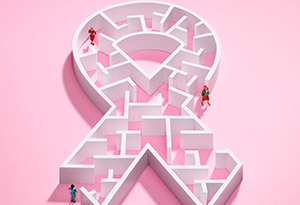How a 23 Year Old Survived Breast Cancer—and What You Can Learn

Photo: Adam Voorhes
PAGE 2
Fact: More than 85% of women who develop breast cancer have no family history of the disease.
What are the odds?
Roughly 5 percent of new breast cancer cases occur in women under 40—about 13,000 diagnoses each year. "The younger you are, the lower the odds, but I have diagnosed breast cancer in women as young as 18," says Therese Bevers, MD, medical director of the Cancer Prevention Center at MD Anderson Cancer Center in Houston. The good news: The five-year survival rate for women under 40 is 84 percent.
Is breast cancer among young women on the rise?
According to a 2013 study in The Journal of the American Medical Association, the incidence of localized breast cancer among women under 40 showed no increase between 1976 and 2009. But the incidence of metastatic breast cancer (which is less common) nearly doubled over the same span.
Are self-exams still best?
Early detection is especially key for young women, as premenopausal breast cancer is often more aggressive and harder to treat than breast cancer in older women. "Nearly 80 percent of younger women find their own breast cancer lumps," says Jennifer Merschdorf, CEO of the Young Survival Coalition. "It's natural for young women to have lumpy breasts or cysts, and in most cases, nothing is wrong. But if a lump doesn't go away, you should absolutely get it checked out."
I found a lump. What tests should my doctor perform?
Mariana Chavez-Mac Gregor, MD, an assistant professor of breast medical oncology at MD Anderson Cancer Center, assesses the three most widely used options:
Some chemotherapy drugs have been found to genetically damage or destroy eggs or send patients into a type of medical menopause. Don't panic. The younger the patient, the more likely her ovaries and eggs will recover. And the options for patients whose infertility proves permanent are expanding: Now that the American Society of Reproductive Medicine has officially endorsed egg freezing for young women with cancer, it's expected that more insurance companies will cover parts of the costly procedure.
—Sunny Sea Gold
Next: Support for young women with breast cancer
Could it happen to you?
Setting the record straight about young women and breast cancer.What are the odds?
Roughly 5 percent of new breast cancer cases occur in women under 40—about 13,000 diagnoses each year. "The younger you are, the lower the odds, but I have diagnosed breast cancer in women as young as 18," says Therese Bevers, MD, medical director of the Cancer Prevention Center at MD Anderson Cancer Center in Houston. The good news: The five-year survival rate for women under 40 is 84 percent.
Is breast cancer among young women on the rise?
According to a 2013 study in The Journal of the American Medical Association, the incidence of localized breast cancer among women under 40 showed no increase between 1976 and 2009. But the incidence of metastatic breast cancer (which is less common) nearly doubled over the same span.
Are self-exams still best?
Early detection is especially key for young women, as premenopausal breast cancer is often more aggressive and harder to treat than breast cancer in older women. "Nearly 80 percent of younger women find their own breast cancer lumps," says Jennifer Merschdorf, CEO of the Young Survival Coalition. "It's natural for young women to have lumpy breasts or cysts, and in most cases, nothing is wrong. But if a lump doesn't go away, you should absolutely get it checked out."
I found a lump. What tests should my doctor perform?
Mariana Chavez-Mac Gregor, MD, an assistant professor of breast medical oncology at MD Anderson Cancer Center, assesses the three most widely used options:
- Ultrasound. "In young women, most of the time we order an ultrasound first," Chavez-Mac Gregor says. They're quick, simple and good at evaluating cysts—small, usually benign fluid-filled sacs many women have in their breasts.
- Mammogram. "Young breasts tend to be very dense, so a mammogram will likely not show you much, but it can detect things like calcifications that an ultrasound can't," Chavez-Mac Gregor says.
- MRI. Because the highly detailed pictures they yield can sometimes trigger unnecessary biopsies of normal lumps, MRIs are often reserved for women who have tested positive for a breast cancer gene mutation (like BRCA1 or 2) or have a strong family history of the disease.
Some chemotherapy drugs have been found to genetically damage or destroy eggs or send patients into a type of medical menopause. Don't panic. The younger the patient, the more likely her ovaries and eggs will recover. And the options for patients whose infertility proves permanent are expanding: Now that the American Society of Reproductive Medicine has officially endorsed egg freezing for young women with cancer, it's expected that more insurance companies will cover parts of the costly procedure.
—Sunny Sea Gold
Next: Support for young women with breast cancer



